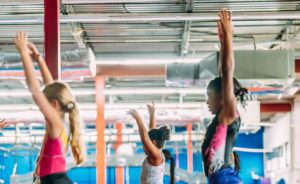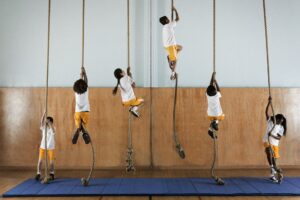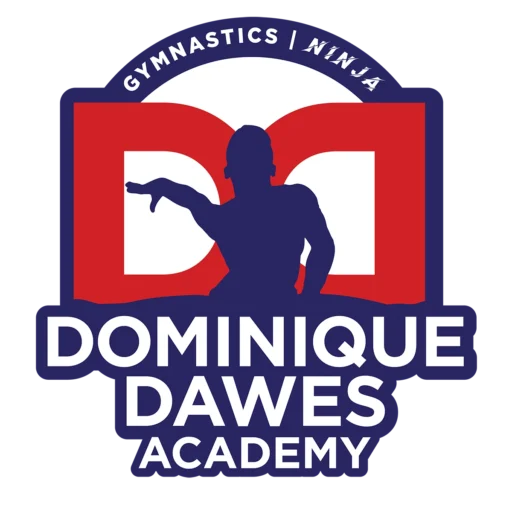
We know this scene all too well.
It’s a gorgeous Saturday in Alpharetta, and you’re sitting at Wills Park watching your four-year-old haphazardly climb the “big kid” playground equipment with a terrifying mix of bravery and bobble-head coordination. Or, maybe you’re chasing your 18-month-old through the sprinklers at Webb Bridge Park in awe at how much energy they have. (Hint: they have a lot of energy.)
One thought pops into your head: “OK, so what next? Time for T-ball? Soccer? Swim lessons?”
As a team of professional child development experts who specialize in fitness, as well as parents ourselves, we’ve all had this thought. In fact, we’ve had it many times over, both personally and with thousands of other families who come to us for guidance.
The good news? If you live in Alpharetta, you have an embarrassment of riches. Youth sports in Alpharetta, Georgia, offer everything from massive public parks to world-class private academies. The bad news? It can be a lot to take in. You don’t just want some generic activity for Tuesdays at 5; you want an activity that’s going to help your child feel proud of what they can do. Give them confidence and, hopefully, lead them toward a life of loving to be active.
The problem, of course, is that pressure you feel to “choose right.” What if they’re “behind” on social skills or “underdeveloped” compared to other kids their age? What if we don’t give them T-Ball and they don’t know how to throw and catch a ball “correctly?” Where do we even begin with this journey of raising a child, teaching them to run and climb and have fun outside?
Let us help.
Welcome to your ultimate guide on the topic, with our unique perspective as fitness pros and parents. We’re going to focus on this decision-making process, take an honest look at the thriving world of kids activities in North Atlanta, walk you through a simple and practical decision-making framework on how to choose youth sports that cuts past “what are the neighbors doing,” and share some professional insider knowledge on why, if you’re only going to do one thing, a focus on foundational skills is the single best investment you can make.
Exploring Alpharetta's Youth Sports Landscape: From Wills Park to Private Academies
The first piece of advice we always give to families is to, quite literally, breathe. Take a second and appreciate that you’re here in Alpharetta, where our local government truly cares about activity and family.
In fact, there are more options for youth sports than we can possibly cover. From the Alpharetta Recreation, Parks & Cultural Services to private programming, there’s truly an activity for every interest.
Team Sports & Recreation Leagues: The “Classics”
If you ask a parent in Alpharetta, “What’s your kid doing on Tuesdays at 5?” the first thing many of us will think of are the “classic” team and recreational sports and leagues.
Baseball/T-Ball: The Alpharetta Youth Baseball Association (AYBA), which is primarily based at Wills Park, is a mainstay. It’s where many of us learned about uniforms and teamwork for the first time (as well as how to hit off a tee.)
Soccer: Walk by Webb Bridge Park or North Park on a Saturday morning and you’ll see fields full of colorful, wriggling swarms of tiny people in soccer uniforms. Local churches, YMCAs, and other soccer organizations have classes for ages 3 and up.
Swimming: City programs and a ton of private swim schools mean swimming is really less of a “sport” and more of a key life skill in Georgia.
The “Pros” of these activities are that they can help kids understand basic rules, be part of a team environment (what does it really mean to “pass” or “wait your turn”), and just run around and use a ton of that incredible preschooler energy. They also mean your child can do a lot of different things depending on the season.
Some Considerations: For a 2-7-year-old, team sports are (and should be) more about being part of “organized chaos” than about mastery of any skill, and it will be a lot more “kick the ball that way” than individual dribbling, for example. We would also note that individual skills and body awareness can be lost or become secondary in a fast-moving team environment. These programs also often have set seasons, depending on the weather, which means you’ve committed to one thing for a few months or more.
Other Options: Beyond the Ballfield
As any family in Alpharetta will also know, this list of options is just the tip of the iceberg. We have a rich offering of:
Martial Arts: Programs at dojos for the “little dragons” or “tiny tigers” of the world. Think discipline, respect, and body control.
Dance/Ballet: Plenty of studios throughout Alpharetta and the surrounding Roswell and Johns Creek areas where your little one can find rhythm, grace, and the joy of following choreographed instruction.
Recreation Center Classes: Did you know the city of Alpharetta has recreation centers that offer amazing, low-cost programs for kids as young as 18 months, including everything from “Mommy and Me” movement and baby sign language classes to tennis?
How to Choose Between Different Youth Activities: A Parent's Decision Framework
Here’s the key, and it will sound like the answer to any parents-of-young-kids question: it’s less about “the right” answer and more about which is right for your family, and, even better, the specific needs and wants of your child.
As child development experts who know how to pick out high-quality programs for children, we also encourage parents to filter options through a specific framework that puts the unique needs of your individual child over things like the program’s perceived prestige or popularity. As you get ready to invest the time and money into a class or league, ask yourself these questions.
Factor 1: First, Who is Your Child?
It’s a simple question. But we think so many people skip it.
Look at your child, specifically at your child as they are right now, and not as you think or hope they will be. This is an individual, unique little person, and it will change dramatically from the next year to the next, so let’s get specific.
Who are they now?
The Observer vs. The Doer
Does your child prefer to stand back and watch for 20 minutes before cautiously approaching an activity? A high-energy, potentially chaotic and loud soccer class could be overwhelming for a child like this. They may thrive in an environment where they have the space to watch and then progress on their own timeline. Conversely, if you have the child who is climbing on the furniture and seems to be constantly in motion, they may need a high-energy activity to channel all that energy.
Group vs. Individual
Does your child feed off the energy of a large group, or does your child tend to be easily distracted and much happier with more individual attention and focus?
Sensory & Motor Skills
If you think about it, your child is also in a variety of stages with their gross motor skills and their sensory tolerance. Are they a generally cautious child who approaches things slowly and thoughtfully? Or do you have the “crash and tumble” kid who takes off running and doesn’t stop? Children who are naturally more cautious may also need to work on core strength and stability before they can truly enjoy or “stay on” with an activity that asks them to run and kick a ball simultaneously, for example.
Factor 2: Should We Choose One Sport Early and Specialize or Build a Skill Foundation First?
In our community, there’s a tendency to “choose right.” To make sure your child is in the most “intense” swimming class, the “high-impact” soccer camp, or whatever the sports are that “everyone else is doing.”
You know where we stand on this as fitness pros: Your child is young. It’s not about picking a sport now that will lead to your child being the starting pitcher for the Braves one day. It’s about building fundamental movement and sport skills so your child has the abilities, knowledge, and most importantly, confidence and motivation to be active for life.
For young children, the goal is not sports. The goal is Physical Literacy.
Physical Literacy is the term used by fitness and child development professionals for the building of core fundamental movement skills (running, jumping, throwing, catching, etc.) as well as fundamental sport skills.
In addition, a physically literate child has the confidence, motivation, and understanding to transfer those skills to a lifetime of movement.
Factor 3: The “Parent Practicality” Test
Let’s get honest with ourselves — we know all of these well-intentioned parents out there. We know it gets busy in North Atlanta. It’s not a secret to anyone that we’re juggling schedules, jobs, and desperately trying to make it to a fun local event like Taste of Alpharetta or the Alpharetta Arts Streetfest before it’s over.
Location and Schedule: How is this program going to fit with the reality of your lives? A conveniently located program with multiple session options has a better chance of being something your family can stick with for the long haul.
Cost and Commitment: This is a tough one in every situation. Is this something that has a high upfront cost for a long season? Or a lower-cost model with more flexibility and that offers year-round enrollment?
Program Philosophy: This is where we find a lot of parents get distracted. Does the website or a trial class feel warm and welcoming and focused on the kids, or intense and overly competitive? With young children, this really is the key. They are not going to succeed in a program that is not laid-back, warm, and inviting.
Why Gymnastics Offers Unique Advantages Over Traditional Team Sports
Gymnastics can feel intimidating or scary for parents at first. Not all of our friends or family members “got it” when we first introduced it as an option for our children.
Let’s think of it in terms of our Decision-Making Framework above. If you’ve read this far, we’re going to guess you’ve filtered the search for a first “sport” or activity for your child and landed on one of our core concepts: focus on building the core skills that will translate to all activities, sports, and physicality your child wants to do.
When we say gymnastics, we’re not just talking about the Olympic rings. We’re not even talking about the gymnastics classes you may remember from summer camp as a kid (though we love those programs, too!)
We’re talking about gymnastics specifically designed for your two-year-old and three-year-old with a purpose-built curriculum based around purposeful play.
Here’s why we know children who play gymnastics have an edge, and it all comes back to our Parent Practicality Filter from above, including that core focus on building movement skills. Kids 2-7 have way more curiosity and flexibility than any of us do.
Think about those years of life. In two years, they can go from not walking or talking to climbing stairs, swinging by themselves, and giving full updates on the latest Paw Patrol episode. In four years, it’s from mastering stairs to learning basic karate kicks and jumps on a trampoline.
In gymnastics, you have the opportunity to accelerate that development for your little ones in a fun, playful, and incredibly safe environment.
3 Key Reasons Gymnastics Builds Foundation for “Any” Sport
Gymnastics is the “ABC” of all movement. Hold on to this point. The most important concept here, especially if you’re trying to sort through “what’s the best” for your child: gymnastics has been proven by data-driven movement professionals to be the real curriculum for physical literacy.
Agility: Kids try to navigate our obstacle courses, do rolls, turn, and twist, and change direction in a matter of seconds. Agility is the ability to move your body efficiently and quickly to a new position or location.
Teach a child how to do bear crawls, and you have just helped your child develop agility that can immediately apply to running, catching a ball, or ducking out of the way on the playground.
Balance: Climbing a low beam, standing on one foot, or holding a “tabletop” position all teach your child incredible core strength and balance (the vestibular system).
Kids who have “balance” also have the powerful core strength needed for activities like swinging a baseball bat or a golf club or even the strokes of swimming.
Coordination: This is a biggie. We talk about it a lot in our classes. If we ask a 3-year-old child to do jumping jacks or bear crawls or climb a rope ladder (even a small one!) they’re suddenly using their upper body, lower body, and core together.
Activities like that which force kids to cross their arms and legs (cross lateral movement) are proven to create stronger neural pathways in the brain.
On top of those skills, gymnastics at this level is also a great way to build muscle strength.
The Takeaway: Is “Building a Foundation” the “Right” Choice for Your Family?
Choosing your child’s first activity can be a process. There are lots of choices. But as our team at Dominique Dawes Gymnastics Academy has learned through years of coaching kids in sports and exercise as professionals and parents, it doesn’t have to be stressful.
So, you have an idea of the options in North Atlanta and a simple, three-factor decision-making guide for how to choose the “right” thing for your child and family.
If we’ve done our job, we also hope you’ve thought about a key principle here that separates our unique approach from other first activities, sports, and physicality for your 2-7-year-old.
When it comes to that first “sport” your child does in life, there is an option that is truly the foundation for every other sport they ever want to do or try. And that’s the key, right? We want our children to have options and a chance to try new things.
Forget about which team sport is the most popular for kids or where your kids should go to play baseball. We’re looking for options for 2-7 year olds, which means time to develop fundamental movement skills, curiosity, confidence, and most importantly, a love of being active!
Reach out to us to set up a tour or learn more about what makes Dominique Dawes Gymnastics Academy the best choice for families in the Alpharetta area.




